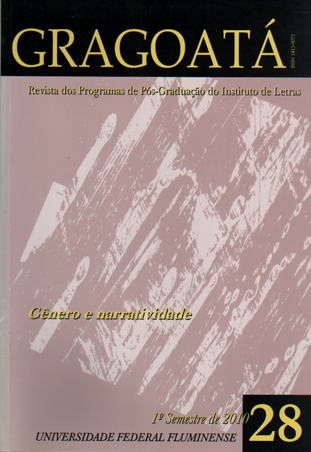Narrativization and sexual subversion: considerations on Puig, Abreu and Bayly
DOI:
https://doi.org/10.22409/gragoata.v15i28.33096Keywords:
Narratology. Latin American Lite¬rature.Queer poeticsAbstract
This paper aims at analyzing in a contrastive way three representative novels of the problematic of the male homosexual identity in Latin America: Manuel Puig’s El beso de la mujer araña (Argentine, 1976), Caio Fernando Abreu’s Onde andará Dulce Veiga? (Brazil, 1990) and Jaime Bayly’s No se lo digas a nadie (Peru, 1994). The articulation of a queer epistemology allows us to think about textuality as a place of dramatization of a politic fiction that questions the heteronormative patterns of sex and gender, and proposes a strategy of resistance based both on bodies and pleasures and on politics of representation and reinvention of masculinities and femininities. Taking feminist assumptions, narratology and queer theory/epistemology as theoretical basis, it is made a critical reading of these novels, which are presented against the heteronormative model and invest in the subversive potential of a place of enunciation in the literary discourse marked by difference and resistance to the heteronormative disposals of regulation of sexual identities. At last, the contradictions and impasses that emerge from the novels are analyzed, particularly in which concerns questions of race, class and gender, as well as the potentialities and problematic points of a queer poetics as a place of cultural intervention.
Downloads
Downloads
Published
Issue
Section
License
Authors who publish in Gragoatá agree to the following terms:
The authors retain the rights and give the journal the right to the first publication, simultaneously subject to a Creative Commons license CC-BY-NC 4.0, which allows sharing by third parties with due mention to the author and the first publication by Gragoatá.
Authors may enter into additional and separate contractual arrangements for the non-exclusive distribution of the published version of the work (for example, posting it in an institutional repository or publishing it in a book), with recognition of its initial publication in Gragoatá.

Gragoatá is licensed under a Creative Commons - Attribution-NonCommercial 4.0 International.











